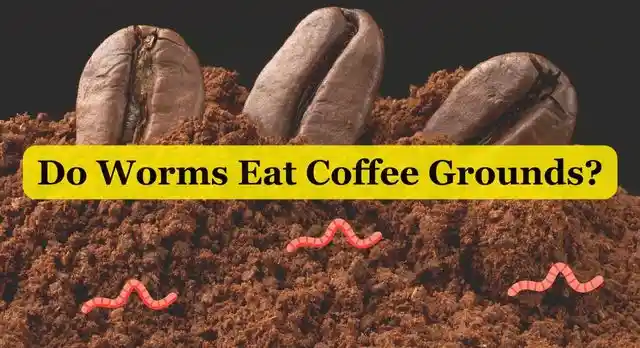Do Worms Eat Coffee Grounds? – WormSurvey.org
Coffee lovers rejoice! Not only does your favourite morning brew provide a jolt of energy, but its byproduct, coffee grounds, can also serve as a valuable resource for our wriggly friends – worms. Yes, worms are voracious eaters and, in fact, they have a special affinity for coffee grounds. In this article, we will explore the fascinating world of vermicomposting and delve into the question, “Do worms eat coffee grounds?” So, grab a cup of coffee, sit back, and let’s uncover the secrets of vermicomposting together.

Do Worms Really Eat Coffee Grounds?
Yes, worms do indeed eat coffee grounds. Coffee grounds are considered a valuable food source for worms due to their organic composition and nutrient content. Worms find the coffee grounds highly palatable and readily consume them. As the worms digest the coffee grounds, they break them down into smaller particles, aiding in the decomposition process.
Benefits of Adding Coffee Grounds to Vermicomposting
- Nutrient-Rich Compost: Coffee grounds are rich in organic matter and contain essential nutrients like nitrogen, potassium, and phosphorus. When added to vermicomposting systems, coffee grounds contribute to the production of nutrient-dense compost that can greatly benefit your garden or potted plants.
- Improved Soil Structure: Coffee grounds help improve soil structure by increasing its water retention capacity and promoting aeration. This can lead to healthier plant growth and stronger root development.
- pH Regulation: Coffee grounds have a slightly acidic pH, which can be beneficial for plants that thrive in acidic soil conditions. However, it’s important to maintain a balance and avoid excessive acidity by adding coffee grounds in moderation.
- Waste Reduction: By incorporating coffee grounds into your vermicomposting system, you are diverting waste from the landfill and contributing to a more sustainable lifestyle. Coffee grounds are a readily available resource that can be recycled and repurposed through vermicomposting.
Tips for Adding Coffee Grounds to Your Vermicomposting System
To ensure successful integration of coffee grounds into your vermicomposting system, keep the following tips in mind:
- Moderation is Key: While worms love coffee grounds, it’s important not to overwhelm them with an excessive amount. Start by adding small quantities and gradually increase the amount as the worms adapt to the new food source.
- Balancing the Carbon-Nitrogen Ratio: Coffee grounds are considered a “green” nitrogen-rich material. To maintain a balanced carbon-nitrogen ratio in your vermicompost, it is advisable to mix coffee grounds with “brown” carbon-rich materials such as shredded newspaper, cardboard, or dry leaves.
- Preparation Methods: Some vermicomposters prefer to pre-compost coffee grounds before adding them to their worm bins. This can be done by allowing the coffee grounds to decompose in a separate container for a few weeks. Pre-composting coffee grounds helps to break them down further, making them more easily digestible for worms.
- Avoid Mold and Odor: Coffee grounds have a tendency to mold when they are too compact or damp. To prevent this, ensure proper aeration and drainage in your vermicomposting system. If you notice any foul odor, it may indicate an excess of coffee grounds or improper balance in the bin. Adjust accordingly to maintain a healthy vermicomposting environment.
Checkout more about – What do earthworms like to eat?
Key Takeaway
Coffee grounds are a welcome addition to any vermicomposting system. Worms are more than happy to munch on these organic leftovers and convert them into valuable compost. By adding coffee grounds to your vermicomposting routine, you can create nutrient-rich soil amendments, improve soil structure, regulate pH levels, and contribute to waste reduction. Remember to exercise moderation, maintain a balanced carbon-nitrogen ratio, and provide proper aeration to ensure a successful vermicomposting experience. So, the next time you brew a cup of coffee, think twice before discarding those grounds and let the worms work their magic.
Now, armed with the knowledge that worms do indeed eat coffee grounds, it’s time to put that coffee waste to good use and embark on your vermicomposting journey. Your plants will thank you, and you’ll be making a positive impact on the environment, one cup of coffee grounds at a time.
Related Guide
FAQs
Can worms live off of coffee grounds?
While worms can consume coffee grounds and benefit from their nutrient content, they cannot live solely on coffee grounds alone. Worms require a varied diet to obtain all the necessary nutrients for their survival. Coffee grounds should be considered a supplemental food source rather than the sole source of nutrition for worms.
How much coffee grounds can you feed worms?
When feeding coffee grounds to worms, it’s important to do so in moderation. Start by adding small amounts of coffee grounds to the worm bin and observe how the worms respond. Gradually increase the quantity over time as the worms adjust to this new food source. It’s recommended to maintain a balance by combining coffee grounds with other organic materials, such as shredded paper or vegetable scraps, to provide a diverse diet for the worms.
Do earthworms eat coffee grounds?
Yes, earthworms can eat coffee grounds. Coffee grounds are an organic material that earthworms can consume as part of their diet. Coffee grounds can provide some nutrients to the worms and can be beneficial when mixed with other organic matter in the soil.
Do coffee grounds kill earthworms?
No, coffee grounds do not typically kill earthworms. In fact, some studies suggest that coffee grounds can be beneficial to earthworms and the soil. However, it’s important to note that excessive amounts of coffee grounds or the presence of certain chemicals in coffee can potentially be harmful to earthworms. It’s best to use coffee grounds in moderation and avoid using coffee that has been treated with pesticides or chemicals.
